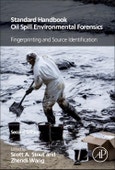Standard Handbook Oil Spill Environmental Forensics: Fingerprinting and Source Identification, Second Edition, provides users with the latest information on the tools and methods that have become popular over the past ten years.
The book presents practitioners with the latest environmental forensics techniques and best practices for quickly identifying the sources of spills, how to form an effective response, and how to determine liability. This second edition represents a complete overhaul of the existing chapters, and includes 13 new chapters on methods and applications, such as emerging application of PAHi isomers in oil spill forensics, development and application of computerized oil spill identification (COSI), and fingerprinting of oil in biological and passive sampling devices.
- Contains 13 new chapters on methods and applications, including emerging application of PAH isomers in oil drill forensics, the development and application of computerized oil spill identification (COSI), and the fingerprinting of oil in biological and passive sampling devices
- Presents the latest technology and methods in biodegradation of oil hydrocarbons and its implications for source identification, surface trajectory modeling of marine oil spills, and identification of hydrocarbons in biological samples for source determination
- Contains new case studies to illustrate key applications, methods, and techniques
Table of Contents
1. Spill Site Characterization in Environmental Forensic Investigations 2. Sampling Procedures for Securing Evidence for Waterborne Oil Spill Identifications 3. Chemical Fingerprinting Methods and Factors Affecting Petroleum Fingerprints in the Environment 4. Petroleum Biomarker Fingerprinting for Oil Spill Characterization and Source Identification 5. Polycyclic Aromatic Hydrocarbon Homolog and Isomer Fingerprinting 6. Polycyclic Aromatic Sulfur Heterocycles as Source Diagnostic of Petroleum Pollutants in the Marine Environment 7. Forensic Studies of Naphthenic Acids Fraction Compounds in Oil Sands Environmental Samples and Crude Oil 8. Applications of Comprehensive Two-Dimensional Gas Chromatography (GC×GC) in Studying the Source, Transport, and Fate of Petroleum Hydrocarbons in the Environment 9. Oil Fingerprinting Analysis using Gas Chromatography-Quadrupole Time-of-Flight (GC-QTOF) 10. Application of Isotopic Compositions in Fugitive Petroleum Product Identification and Correlation 11. Chemical Fingerprinting of Gasoline and Distillate Fuels 12. Forensic Fingerprinting of Biodiesel and Its Blends with Petroleum Oil 13. Chemical Character of Marine Heavy Fuel Oils and Lubricants 14. CEN Methodology for Oil Spill Identification 15. Development and Application of On-Line Computerized Oil Spill Identification COSIWeb 16. A Multivariate Approach to Oil Hydrocarbon Fingerprinting and Spill Source Identification 17. Advantages of Quantitative Chemical Fingerprinting in Oil Spill Identification and Allocation of Mixed Hydrocarbon Contaminants 18. Statistical Analysis of Oil Spill Chemical Composition Data 19. Biodegradation of Oil Hydrocarbons and Its Implications for Source Identification 20. Photochemical Effects on Oil Spill Fingerprinting 21. Oil Spill Remote Sensing: A Forensics Approach 22. Water Column Sampling for Forensics 23. Forensic Trajectory Modeling of Marine Oil Spills 24. Identification of Hydrocarbons in Biological Samples for Source Determination
Authors
Stout, ScottDr. Stout has more than 20 years of petroleum and coal industry experience. He specializes in chemical compositions of fuel-derived sources of contamination in terrestrial and marine environments, which includes crude oil, coal, gasoline and other substances. His research has been used for decision making by the United States Departments of Justice and Defense, and by the forest products, utility, railroad, wood treatment, maritime shipping, port operations, and oil and gas industries. Dr. Stout has authored or co-authored nearly 120 scientific papers and edited a textbook on the environmental forensics aspects of maritime oil spills.
Wang, Zhendi
Dr. Zhendi Wang is a senior research scientist and Head of Oil Spill Research of Environment Canada, working in the oil and toxic chemical spill research field. His specialties and research interests include: development of oil spill fingerprinting and tracing technology, environmental forensics of oil spill; oil properties, fate and behavior of oil and other hazardous organics in the environment; oil burn emission and products study; oil bioremediation; identification and characterization of oil hydrocarbons; and, spill treatment studies; applications of modern analytical techniques (such as GC, GC/MS, HPLC, LC/MS, SFE and SFC, and IC) to oil spill studies and other environmental science and technology.
Dr. Wang has continually and extensively led and been involved in various scientific projects, technology transfer, and national and international cooperative researches with the total funding over 3 million dollars. He has authored over 270 academic publications including 72 peer-reviewed articles and 4 invited reviews in the most respected journals in the environmental science and chemistry, and 8 books and book chapters. The productivity, excellence and achievements of Dr. Wang have established him as a national and international "leading authority on the topic?. He has won a number of national and international scientific honours and awards. Wang is also a member of America Chemical Society (ACS), the Canadian Society for Chemistry (CSC), and the International Society of Environmental Forensics.








